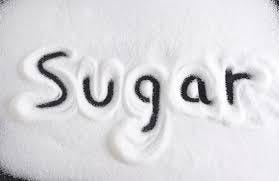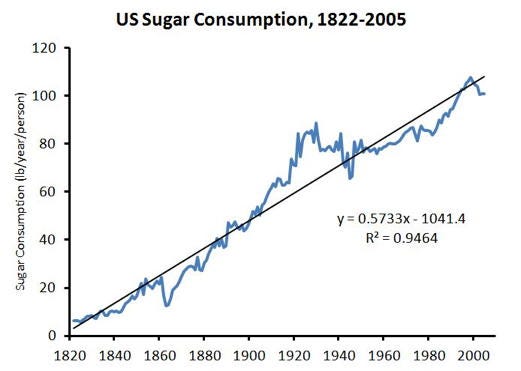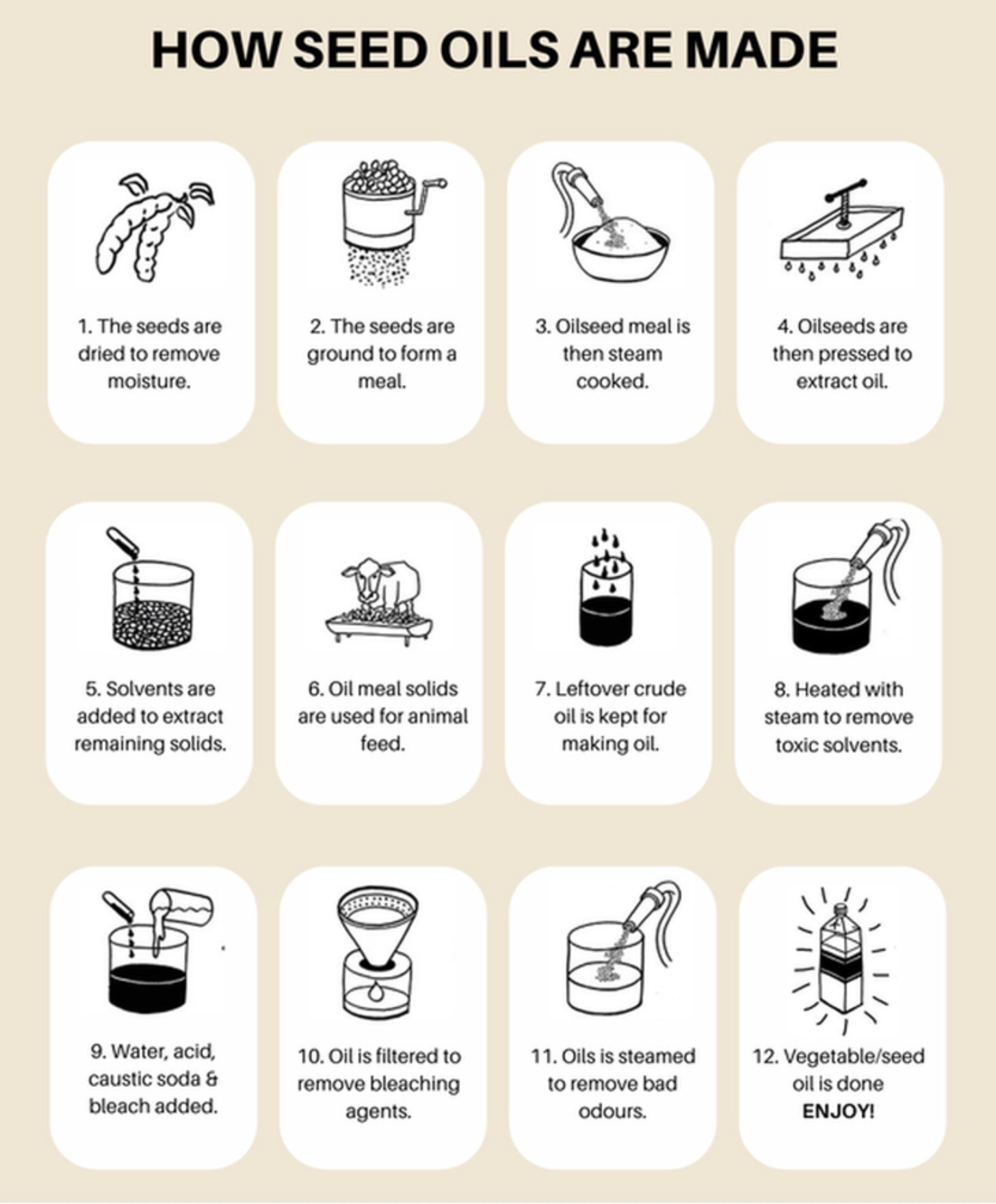Sugar: The Sweet Truth and the Big Fat Deception
Obesity and chronic disease are more complicated than we've been led to believe
Sugar gets demonized a lot. I used to demonize it too.
Robert Lustig is a famous pediatric endocrinologist and physician researcher specialized in obesity, who, ever since his video, Sugar: The Bitter Truth went viral on Youtube in 2009, has been on a crusade against sugar (I wondered who funds him and could not figure it out).
He was instrumental in helping formulate the 2009 American Heart Association’s strict guidelines on added sugar: no more than 100 calories per day for women (6 teaspoons) and 150 for men (9 teaspoons).
Meanwhile this graph recently made the rounds calling into question the correlation between sugar intake and obesity:
Sugar intake, while still much higher than historic norms, had been plummeting for over a decade by the time Lustig went viral with his anti-sugar message in 2009, yet obesity rates continued climbing as though nothing had changed.
So what’s going on here? Is sugar really the primary cause of obesity, or just one of many rising causes? Or is it more complicated?
I’ve found that some people feel best when they eat a lot of carbs. Not just a temporary sugar high, but truly better health all around.
There’s a whole subculture of Ray Peat aficionados who had often spent years on low carb, no sugar diets and felt terrible - until they started eating more sugar, often in the form of whole food carbs, but also added refined sugar.
On the other hand there are probably many more people who have been heavily addicted to sugar their entire lives, also feel terrible, and quitting sugar and carbs seems to make all the difference to their health.
Meanwhile, historically, most human societies have gotten by just fine with a significant amount of carbohydrates in their diets, without obesity - just look at the US, we ate less refined sugar 70 years ago, but still dramatically more than any other civilization in human history, and we were not anywhere near as obese or unhealthy as we are today.
Maybe that sorta plateau between 1920 and 1980 was just the furthest limit of sugar consumption we could possibly sustain without blowing up into human balloons?
That’s certainly a reasonable possibility. Looking at this zoomed out graph you can see that what looked like a precipitous drop earlier, just looks like a dent in the long term uptrend now.
But there’s another subculture of biohackers and optimizers that has found themselves going from sugar intolerant to sugar tolerant.
Some people have found that when they correct their metabolic dysfunction and remain lean for long enough, they no longer have to be as strict as they used to in order to avoid regaining excess weight or re-triggering type 2 diabetes.
They can seemingly miraculously eat a normal amount of carbs and sugar again.
What could explain these seeming outliers? And could this be something we could all aspire to?
It may be that sugar intolerance (weight gain, diabetes) is just a superficial problem manifesting due to some deeper dysfunction.
The best candidate for this deeper dysfunction is vegetable seed oils.
This toxic trash was never used before in human history, until debt driven fiat monetary inflation made it necessary for governments to identify cheaper cooking oils.
The reason it was never used before was that it tasted and smelled repulsive.
As nature intended: you see vegetable seeds are not meant to be eaten. At the most they're meant to pass through an animal’s digestive tract and be planted in the earth to propagate the plant species. So unlike the sweet fruits that plants “want” animals to consume from them, the seeds are very bitter.
Bitterness is a useful signal to animals: it means this is toxic, don’t eat it. If you do you’ll be sorry, it will make you sick.
The only way we could make the oils that came from crushing those seeds seemingly fit for human consumption was by complex industrial processes involving heavy machinery and a lot of chemicals to deodorize and sanitize the sludge that had previously only been used by sane people to grease the wheels of other machines.
Now, what we eat for fat is of the utmost importance because fat is what we use to make the chemical messengers called hormones, and even more importantly it’s like the cement in a city: every single cell wall is built out of fat.
The right kinds of healthy traditional fats from animals and fruits, like olive and coconut oils, will create cell walls with just the right amount of pliability, stability and durability.
Whereas cell walls constructed out of vegetable seed oils create the wrong kind of cell walls.
This changes the function of cells, their ability to respond to their environmental/chemical signals and to produce their own signaling compounds.
The other problem is that the seed oils are inherently unstable and inflammatory, they develop harmful trans fats and carcinogenic chemicals like acrolein within them due to their processing, and they tend to “oxidize” other normal oils around them, so in a way they “infect” other fats and spread their inflammatory dysfunction.
Some seed oils are labelled “heart healthy” because they are particularly high in omega 3s, like canola.
However the other problems far outweigh the supposed benefits of the omega 3 consumption (and even the omega 3s themselves should be called into question when eaten in refined isolation from the living food matrix of the fish or plants they originated within.
Chris Masterjohn has done some great work suggesting that high dose Omega 3s taken as supplements are initially anti-inflammatory, but later lead to a pro-inflammatory state.
We need to consider that acute inflammation isn’t bad, and chronic inflammation is not the root dysfunction causing chronic illness. What is triggering the chronic inflammation is the real problem, so simply reducing the inflammation, while it reduces symptoms, is not a solution. It is standing in the way of the solution, and likely increasing the foothold the problem has within you, since the body’s immune response is being hampered).
So it’s entirely possible that the original metabolic sin is the consumption of seed oils, leading to leptin resistance (spurring appetite), and then insulin resistance (with carb sensitivity) - both of these leading to visceral fat accumulation, weight gain and all other chronic diseases.
There are other chemical “obesogens,” particularly pesticides, plastics, and xenoestrogens, that tend to make us fat and sick, but none are consumed in the tremendous quantities that seed oils are.
What makes the problem particularly insidious is that it takes as much as 2 years after stopping seed oil consumption to fully clear the seed oils out of most of the body’s cells and then discover to your surprise that you can tolerate carbs and sugars again without going down the slippery slope of weight gain and chronic disease.
So, certainly many people need to start with low carb because they do not tolerate carbs at the moment. Carbs do contribute to their weight problem right now. But I consider that only half the battle.
While strictly avoiding carbs, apparently healthy function may be recovered, but resilience won’t not be, until you can once again tolerate an appropriate amount of carbs.
It’s not possibly to determine what’s appropriate without first getting healthy by detoxing from seed oils, chemicals, chronic infections/infestations, and heavy metals and then seeing what you can tolerate and feel optimal eating.
For most people it’s probably not the minuscule amounts allowed on a ketogenic diet. and for many people it could be much higher carb intake than they might expect.
Paul Saladino became famous with the social media username “Carnivore MD,” which he still uses, but he has long since evolved to eating 300+ grams a day of what he considers healthy carbs from minimally processed fruits, honey and milk.
He initially felt great on an all meat diet, but after some years began to deteriorate significantly until he added back carbs.
People who experiment with the other extreme on vegan diets often experience a similar journey of initial profound improvements in chronic disease followed by worsening a few short years later.
Doing what’s required to get better is hard enough without the trial and error, which is why people save a lot of time and money when they just go straight to someone who knows what they’re doing.
My choice for people who want an all natural approach that works better than any other alternative, is Hakim Shabaz Ahmed, which is why he now works closely with us at mygotodoc.com/hakim. I can confidently say he is the best in the world at healing people at the deepest levels, because he began with himself and then fine tuned his approach on hundreds of people around the world who were so desperate they had no option but to follow his often difficult to implement advice.
But what’s difficult becomes easy when you’re certain it will work and not just waste your time and effort. If you can become convinced that after a short but difficult path you’ll achieve everything you ever wanted, it’s relatively easy to decide to pursue it. Doubts are what stand in the way of most people, so it’s a good thing Hakim Shabaz is good at dispelling them. His confidence shines through when he speaks, and he will usually be able to tell patients things about themselves that he should have no way of knowing, because of not only intuition, but a deep understanding of underlying principles, which reveal connections most people don’t even know exist.








Looks like you and @unbekoming are on the same wavelength today. As I mentioned after reading her substack... and don't forget how bad seed oils are for you EYES!!
And the problem is that if you eat AWAY from home at ALL all you eat is seed oils.
Excellent information and It is very accurate. Seed oils are now put into many products and it does not have to be disclosed. With the new FDA laws almost nothing has to be disclosed.Raw honey is also another scam as now additives can be added, and again we are not told. We have to be very careful as reading the labels are not enough. Research the product and company and ask questions before you purchase. Imported foods as well as the European Union cannot always export their product unless they add "seed oil." Virgin Olive oil has additives also so you need to make sure it is Virgin and pure. Takes work but worth the time. I consume complex carbs and little meat and some sugar with excellent results for years. Thank you Dr Haider!! I am thrilled to have you as mygotoDoctor!!